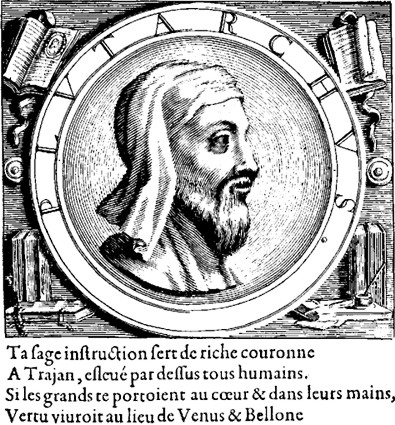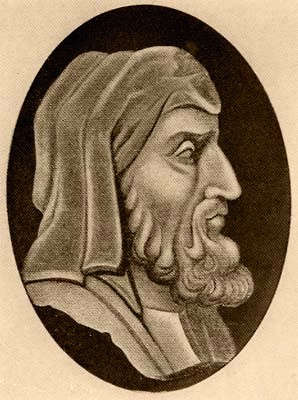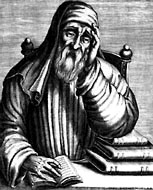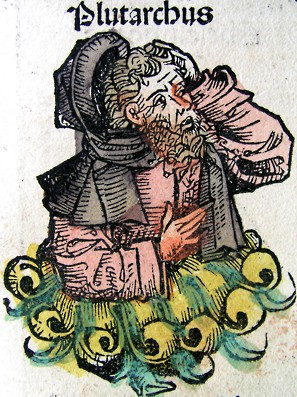Lessico
Plutarco

Storico greco (Cheronea, Beozia![]() , ca. 46 - ca. 125). Di agiata famiglia
borghese, studiò ad Atene. Fu più tardi a Roma, dove ebbe molti amici e dove
venne nominato da Adriano
, ca. 46 - ca. 125). Di agiata famiglia
borghese, studiò ad Atene. Fu più tardi a Roma, dove ebbe molti amici e dove
venne nominato da Adriano![]() procuratore dell'Acaia. Ma la sua vita passò soprattutto nella cittadina
natale, tra gli studi e i doveri sacerdotali nel non lontano santuario di
Delfi.
procuratore dell'Acaia. Ma la sua vita passò soprattutto nella cittadina
natale, tra gli studi e i doveri sacerdotali nel non lontano santuario di
Delfi.
Un catalogo dei suoi scritti, detto di Lampria, elenca 277 opere, che si dividono in due gruppi: gli Scritti morali e le Vite parallele.

I Moralia comprendono gran varietà di operette, nel campo
dell'etica, della religione, della fisica, della politica, della storia, della
letteratura, in genere piuttosto brevi e talora in forma di dialogo. Tra le più
significative nei vari settori sono: Sulla musica, Sull'impossibilità di
vivere felici seguendo i precetti di Epicuro, Le contraddizioni degli stoici,
Sulla faccia visibile della luna, Sul ritardo della vendetta divina, Sulla
decadenza degli oracoli, Sull'E di Delfi, Sugli oracoli pitici, Su Iside e
Osiride, Questioni conviviali, La virtù morale, Precetti coniugali,
Sull'educazione dei figli, Come i giovani debbano sentir leggere i poeti,
Precetti per governare uno Stato, Le virtù delle donne, Questioni romane,
Questioni greche. Come si vede, un eclettismo filosofico in cui il
platonismo, la religiosità mistica, apporti e interessi degli stoici
contrastano soprattutto con l'epicureismo; e sempre un approccio a problemi
pratici, per cui si cercano delle soluzioni semplici e facili. Come il
contemporaneo Seneca![]() ,
anche Plutarco dà ampio spazio all'etica, ma senza approfondire
drammaticamente i problemi psicologici: tale era anche Plutarco nella vita, un
uomo semplice e tranquillo.
,
anche Plutarco dà ampio spazio all'etica, ma senza approfondire
drammaticamente i problemi psicologici: tale era anche Plutarco nella vita, un
uomo semplice e tranquillo.
Stoicismo e presa diretta sulla vita presenta anche la grande opera
storica di Plutarco, cui è soprattutto affidata la sua fama: le Vite
parallele, ventiquattro coppie di biografie di grandi uomini greci e
romani posti in parallelo fra loro per affinità di carattere e vicissitudini
(così si hanno per esempio Teseo e Romolo, Licurgo e Numa, Aristide e Catone![]() ,
Demostene
,
Demostene![]() e
Cicerone
e
Cicerone![]() , Alessandro Magno
, Alessandro Magno![]() e
Cesare
e
Cesare![]() , Pirro e Gaio Mario, ecc.;
quattro vite sono invece isolate fra loro).
, Pirro e Gaio Mario, ecc.;
quattro vite sono invece isolate fra loro).

Le biografie plutarchiane seguono lo schema delle biografie peripatetiche: nascita, gioventù e carattere, imprese, morte; il racconto è intercalato da frequenti osservazioni morali e al termine delle due biografie accoppiate si trova di solito un breve “confronto”. Le fonti sono molto varie e di diverso valore: storici, memorialisti, raccolte di detti e di aneddoti. Del resto, l'interesse di Plutarco è volto soprattutto all'aspetto esemplare della vicenda, per le virtù politiche e morali o per l'insegnamento umano e all'interesse che può suscitare il racconto.
In tal senso, egli sa cogliere compiutamente quanto è tipico in un personaggio o nelle sue vicissitudini e sa attrarre il lettore in un racconto vivace, vario, con punte patetiche memorabili. Lo stile è piuttosto semplice, la lingua è l'attica, ma non pura. La fortuna di questa sua opera fu enorme nei secoli: ispirò drammaturghi come Shakespeare e infiammò spiriti irrequieti come Alfieri, patrioti e uomini politici.

Liber chronicarum – 1493
by Hartmann Schedel (Norimberga 1440-1514)
Plutarch, born Plutarchos (Greek: Πλούταρχος) then, on his becoming a Roman citizen, Lucius Mestrius Plutarchus (Μέστριος Πλούταρχος), c. AD 46 – 120, was a Greek historian, biographer, essayist, and Middle Platonist known primarily for his Parallel Lives and Moralia. He was born to a prominent family in Chaeronea, Boeotia, a town about twenty miles east of Delphi.
Early life
Plutarch was born in AD 46 in the small town of Chaeronea, in the Greek region known as Boeotia. The name of Plutarch's father has not been preserved, but it was probably Nikarchus, from the common habit of Greek families to repeat a name in alternate generations. His family was wealthy. The name of Plutarch's grandfather was Lamprias, as he attested in Moralia and in his Life of Antony. His brothers, Timon and Lamprias, are frequently mentioned in his essays and dialogues, where Timon is spoken of in the most affectionate terms. Rualdus, in his 1624 work Life of Plutarchus, recovered the name of Plutarch's wife, Timoxena, from internal evidence afforded by his writings. A letter is still extant, addressed by Plutarch to his wife, bidding her not give way to excessive grief at the death of their two year old daughter, who was named Timoxena after her mother. Interestingly, he hinted at a belief in reincarnation in that letter of consolation.
The exact number of his sons is not certain, although two of them, Autobulus and second Plutarch, are often mentioned. Plutarch's treatise on the Timaeus of Plato is dedicated to them, and the marriage of his son Autobulus is the occasion of one of the dinner-parties recorded in the 'Table Talk.' Another person, Soklarus, is spoken of in terms which seem to imply that he was Plutarch's son, but this is nowhere definitely stated. His treatise on Marriage Questions, addressed to Eurydice and Pollianus, seems to speak of her as having been recently an inmate of his house, but without enabling us to form an opinion whether she was his daughter or not.
Plutarch studied mathematics and philosophy at the Academy of Athens under Ammonius from 66 to 67. He had a number of influential friends, including Quintus Sosius Senecio and Fundanus, both important senators, to whom some of his later writings were dedicated. Plutarch travelled widely in the Mediterranean world, including central Greece, Sparta, Corinth, Patrae (Patras), Sardes, Alexandria, and two trips to Rome.
At some point, Plutarch took up Roman citizenship. As evinced by his new name, Lucius Mestrius Plutarchus, his sponsor for citizenship was Lucius Mestrius Florus, a Roman of consular status whom Plutarch also used as an historical source for his Life of Otho. "The soul, being eternal, after death is like a caged bird that has been released. If it has been a long time in the body, and has become tame by many affairs and long habit, the soul will immediately take another body and once again become involved in the troubles of the world. The worst thing about old age is that the soul's memory of the other world grows dim, while at the same time its attachment to things of this world becomes so strong that the soul tends to retain the form that it had in the body. But that soul which remains only a short time within a body, until liberated by the higher powers, quickly recovers its fire and goes on to higher things." Plutarch (The Consolation, Moralia)
He lived most of his life at Chaeronea, and was initiated into the mysteries of the Greek god Apollo. However, his duties as the senior of the two priests of Apollo at the Oracle of Delphi (where he was responsible for interpreting the auguries of the Pythia) apparently occupied little of his time. He led an active social and civic life while producing an incredible body of writing, much of which is still extant. For many years Plutarch served as one of the two priests at the temple of Apollo at Delphi (the site of the famous Delphic Oracle) twenty miles from his home. By his writings and lectures Plutarch became a celebrity in the Roman empire, yet he continued to reside where he was born, and actively participated in local affairs, even serving as mayor. At his country estate, guests from all over the empire congregated for serious conversation, presided over by Plutarch in his marble chair. Many of these dialogues were recorded and published, and the 78 essays and other works which have survived are now known collectively as the Moralia.
Work as magistrate and ambassador
In addition to his duties as a priest of the Delphic temple, Plutarch was also a magistrate in Chaeronea and he represented his home on various missions to foreign countries during his early adult years. Plutarch held the office of archon in his native municipality, probably only an annual one which he likely served more than once. He busied himself with all the little matters of the town and undertook the humblest of duties. The Suda, a medieval Greek encyclopedia, states that emperor Trajan made Plutarch procurator of Illyria. However, most historians consider this unlikely, since Illyria was not a procuratorial province, and Plutarch probably did not speak Illyrian. According to the 10th century historian George Syncellus, late in Plutarch's life, emperor Hadrian appointed him nominal procurator of Achaea – a position that entitled him to wear the vestments and ornaments of a consul himself. Plutarch died between the years AD 119 and 127.
Lives of the Roman emperors
The first biographical works to be written by Plutarch were the Lives of the Roman Emperors from Augustus to Vitellius. Of these, only the Lives of Galba and Otho survive. The Lives of Tiberius and Nero are extant only as fragments, provided by Dasmascius (Life of Tiberius, cf. his Life of Isidore) and Plutarch himself (Life of Nero, cf. Galba 2.1), respectively. These early emperors’ biographies were probably published under the Flavian dynasty or during the reign of Nerva (AD 96-98).
There is reason to believe that the two Lives still extant, those of Galba and Otho, “ought to be considered as a single work.” Therefore they do not form a part of the Plutarchian canon of single biographies – as represented by the Life of Aratus of Sicyon and the Life of Artaxerxes (the biographies of Hesiod, Pindar, Crates and Daiphantus were lost). Unlike in these biographies, in Galba-Otho the individual characters of the persons portrayed are not depicted for their own sake but instead serve as an illustration of an abstract principle; namely the adherence or non-adherence to Plutarch’s morally-founded ideal of governing as a Princeps (cf. Galba 1.3; Moralia 328D-E). Arguing from the perspective of Platonian political philosophy (cf. Republic 375E, 410D-E, 411E-412A, 442B-C), in Galba-Otho Plutarch reveals the constitutional principles of the Principate in the time of the civil war after Nero’s death. While morally questioning the behavior of the autocrats, he also gives an impression of their tragic destinies, ruthlessly competing for the throne and finally destroying each other. “The Caesars’ house in Rome, the Palatium, received in a shorter space of time no less than four Emperors,” Plutarch writes, “passing, as it were, across the stage, and one making room for another to enter” (Galba 1).
Galba-Otho was handed down through different channels. It can be found in the appendix to Plutarch’s Parallel Lives as well as in various Moralia manuscripts, most prominently in Maximus Planudes’s edition where Galba and Otho appear as “Opera” XXV and XXVI. Thus it seems reasonable to maintain that Galba-Otho was from early on considered as an illustration of a moral-ethical approach, possibly even by Plutarch himself.
Parallel Lives
Plutarch's best-known work is the Parallel Lives, a series of biographies of famous Greeks and Romans, arranged in pairs to illuminate their common moral virtues and vices. The surviving Lives contain 23 pairs, each with one Greek Life and one Roman Life, as well as four unpaired single Lives. As is explained in the opening paragraph of his Life of Alexander, Plutarch was not concerned with history so much as the influence of character, good or bad, on the lives and destinies of men. Whereas sometimes he barely touched on epoch-making events, he devoted much space to charming anecdote and incidental triviality, reasoning that this often said far more for his subjects than even their most famous accomplishments. He sought to provide rounded portraits, likening his craft to that of a painter; indeed, he went to tremendous effort (often leading to tenuous comparisons) to draw parallels between physical appearance and moral character. In many ways he must count among the earliest moral philosophers. Some of the Lives, such as those of Heracles, Philip II of Macedon and Scipio Africanus, no longer exist; many of the remaining Lives are truncated, contain obvious lacunae or have been tampered with by later writers. Extant Lives include those on Solon, Themistocles, Aristides, Pericles, Alcibiades, Nicias, Demosthenes, Philopoemen, Timoleon, Dion of Syracuse, Alexander the Great, Pyrrhus of Epirus, Romulus, Numa Pompilius, Coriolanus, Aemilius Paullus, Tiberius Gracchus, Gaius Gracchus, Gaius Marius, Sulla, Sertorius, Lucullus, Pompey, Julius Caesar, Cicero, Mark Antony, and Marcus Junius Brutus.
Life of Alexander
Plutarch's Life of Alexander, written as a parallel to that of Julius Caesar, is one of only five extant tertiary sources on the Macedonian conqueror Alexander the Great. It includes anecdotes and descriptions of events that appear in no other source, just as Plutarch's portrait of Numa Pompilius, the putative second king of Rome, holds much that is unique on the early Roman calendar. Plutarch devotes a great deal of space to Alexander's drive and desire, and strives to determine how much of it was presaged in his youth. He also draws extensively on the work of Lysippus, Alexander's favourite sculptor, to provide what is probably the fullest and most accurate description of the conqueror's physical appearance. When it comes to his character, however, Plutarch is often rather less accurate, ascribing inordinate amounts of self-control to a man who very often lost it. It is significant, though, that the subject incurs less admiration from his biographer as the narrative progresses and the deeds that it recounts become less savoury. Much, too, is made of Alexander's scorn for luxury: "He desired not pleasure or wealth, but only excellence and glory." This also is probably untrue, for Alexander's tastes grew more extravagant as he grew older.
Life of Pyrrhus
Plutarch's Life of Pyrrhus is a key text because it is the main historical account on Roman history for the period from 293 to 264 BC, for which neither Dionysius nor Livy have surviving texts.
Criticism of Parallel Lives
"It is not histories I am writing, but lives; and in the most glorious deeds there is not always an indication of virtue or vice, indeed a small thing like a phrase or a jest often makes a greater revelation of a character than battles where thousands die." Plutarch (Life of Alexander/Life of Julius Caesar, Parallel Lives, [tr. E.L. Bowie])
Plutarch stretches and occasionally fabricates the similarities between famous Greeks and Romans in order that he may write their biographies as parallels. The lives of Nicias and Crassus, for example, have nothing in common except that both were rich and both suffered great military defeats at the ends of their lives.
In his Life of Pompey, Plutarch praises Pompey's trustworthy character and tactful behaviour in order to conjure a moral judgement that opposes most historical accounts. Plutarch delivers anecdotes with moral points, rather than in-depth comparative analyses of the causes of the fall of the Achaemenid Empire and the Roman Republic, and tends on occasion to fit facts to hypotheses rather than the other, more scholastically acceptable way round. On the other hand, he generally sets out his moral anecdotes in chronological order (unlike, say, his Roman contemporary Suetonius) and is rarely narrow-minded and unrealistic, almost always prepared to acknowledge the complexity of the human condition where moralising cannot explain it.
Moralia
The remainder of Plutarch's surviving work is collected under the title of the Moralia (loosely translated as Customs and Mores). It is an eclectic collection of seventy-eight essays and transcribed speeches, which includes On Fraternal Affection — a discourse on honour and affection of siblings toward each other, On the Fortune or the Virtue of Alexander the Great — an important adjunct to his Life of the great king, On the Worship of Isis and Osiris (a crucial source of information on Egyptian religious rites), along with more philosophical treatises, such as On the Decline of the Oracles, On the Delays of the Divine Vengeance, On Peace of Mind and lighter fare, such as Odysseus and Gryllus, a humorous dialogue between Homer's Odysseus and one of Circe's enchanted pigs. The Moralia was composed first, while writing the Lives occupied much of the last two decades of Plutarch's own life.
On the Malice of Herodotus
In On the Malice of Herodotus Plutarch criticizes the historian Herodotus for all manners of prejudice and misrepresentation. It has been called the “first instance in literature of the slashing review.” The 19th century English historian George Grote considered this essay a serious attack upon the works of Herodotus, and speaks of the "honourable frankness which Plutarch calls his malignity." Plutarch makes some palpable hits, catching Herodotus out in various errors, but it is also probable that it was merely a rhetorical exercise, in which Plutarch plays devil's advocate to see what could be said against so favourite and well-known a writer. According to Plutarch scholar R. H. Barrow, Herodotus’ real failing in Plutarch’s eyes was to advance any criticism at all of those states that saved Greece from Persia. “Plutarch,” he concluded, “is fanatically biased in favor of the Greek cities; they can do no wrong.”
Questions
Book IV of the Moralia contains the Roman and Greek Questions. The customs of Romans and Greeks are illuminated in little essays that pose questions such as 'Why were patricians not permitted to live on the Capitoline?' (no. 91) and then suggests answers to them, often several mutually exclusive.
Pseudo-Plutarch
Pseudo-Plutarch is the conventional name given to the unknown authors of a number of pseudepigrapha attributed to Plutarch. Some editions of the Moralia include several works now known to be pseudepigrapha: among these are the Lives of the Ten Orators (biographies of the Ten Orators of ancient Athens, based on Caecilius of Calacte), The Doctrines of the Philosophers, and On Music. One "pseudo-Plutarch" is held responsible for all of these works, though their authorship is of course unknown. The thoughts and opinions recorded are not Plutarch's and come from a slightly later era, though they are all classical in origin.
Lost works
The Romans loved the Lives, and enough copies were written out over the centuries so that a copy of most of the lives managed to survive to the present day. Some scholars, however, believe that only a third to one-half of Plutarch’s corpus is extant. The lost works of Plutarch are determined by references in his own texts to them and from other authors' references over time. There are traces of twelve more Lives that are now lost. Plutarch's general procedure for the Lives was to write the life of a prominent Greek, then cast about for a suitable Roman parallel, and end with a brief comparison of the Greek and Roman lives. Currently, only nineteen of the parallel lives end with a comparison while possibly they all did at one time. Also missing are many of his Lives which appear in a list of his writings, those of Hercules, the first pair of Parallel Lives, Scipio Africanus and Epaminondas, and the companions to the four solo biographies. Even the lives of such important figures as Augustus, Claudius and Nero have not been found and may be lost forever.
Influence
Plutarch's writings had an enormous influence on English and French literature. Shakespeare in his plays paraphrased parts of Thomas North's translation of selected Lives, and occasionally quoted from them in verbatim. Ralph Waldo Emerson and the Transcendentalists were greatly influenced by the Moralia — so much so, in fact, that Emerson called the Lives "a bible for heroes" in his glowing introduction to the five-volume 19th-century edition. He also opined that it was impossible to "read Plutarch without a tingling of the blood; and I accept the saying of the Chinese Mencius: 'A sage is the instructor of a hundred ages. When the manners of Loo are heard of, the stupid become intelligent, and the wavering, determined.'"
Montaigne's own Essays draw extensively on Plutarch's Moralia and are consciously modelled on the Greek's easygoing and discursive inquiries into science, manners, customs and beliefs. Essays contains more than 400 references to Plutarch and his works.
James Boswell quoted Plutarch on writing lives, rather than biographies, in the introduction to his own Life of Samuel Johnson. Other admirers included Ben Jonson, John Dryden, Alexander Hamilton, John Milton, and Francis Bacon, as well as such disparate figures as Cotton Mather and Robert Browning. Plutarch's influence declined in the 19th and 20th centuries, but it remains embedded in the popular ideas of Greek and Roman history.